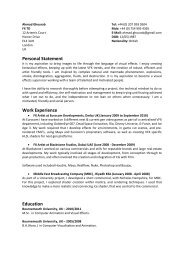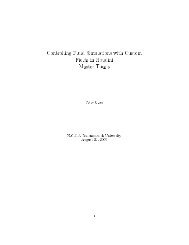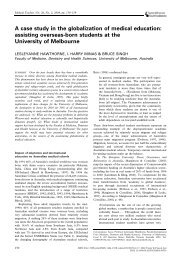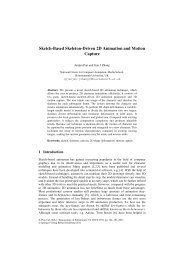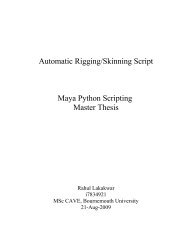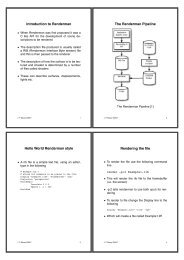The RenderMan Interface - Paul Bourke
The RenderMan Interface - Paul Bourke
The RenderMan Interface - Paul Bourke
- No tags were found...
Create successful ePaper yourself
Turn your PDF publications into a flip-book with our unique Google optimized e-Paper software.
Function<br />
abs(x)<br />
Math Functions<br />
Description<br />
returns the absolute value of its argument.<br />
acos(a) returns the arc cosine in the range 0 to π.<br />
asin(a)<br />
atan(yoverx), atan(y,x)<br />
ceil(x)<br />
cellnoise(v), cellnoise(u,v), cellnoise(pt),<br />
cellnoise(pt,t)<br />
clamp(a,min,max)<br />
returns the arc sine in the range −π/2 to π/2.<br />
with one argument returns the arc tangent in the<br />
range −π/2 to π/2 (1 argument) or −π to π (2<br />
arguments).<br />
returns the largest integer (expressed as a float) not<br />
greater than x.<br />
returns a value which is a pseudorandom function<br />
of its arguments and is constant within each cell defined<br />
by integer lattice points, but discontinuous at<br />
integer values. Its value is always between 0 and 1.<br />
<strong>The</strong> domain of this function can be 1-D (one float),<br />
2-D (two floats), 3-D (one point), or 4-D (one point<br />
and one float).<br />
returns min if a < min, max if a > max; otherwise<br />
a.<br />
cos(a) standard trigonometric function of radian<br />
arguments.<br />
degrees(rad)<br />
converts from radians to degrees.<br />
Du(p), Dv(p), Deriv(num,den) computes the derivatives of the arguments. <strong>The</strong><br />
type returned depends on the type of the first argument.<br />
Du and Dv compute the derivatives in the u<br />
and v directions, respectively. Deriv computes the<br />
derivative of the first argument with respect to the<br />
second argument.<br />
exp(x)<br />
filterstep(edge,s1,...)<br />
floor(x)<br />
log(x), log(x,base)<br />
max(a,b,...)<br />
min(a,b,...)<br />
mix(color0, color1, value)<br />
mod(a,b)<br />
returns pow(e,x).<br />
returns a filtered version of step.<br />
returns the smallest integer (expressed as a float)<br />
not smaller than x.<br />
returns the natural logarithm of x (x=log(exp(x)))<br />
(1 arg.) or the logarithm in the specified base<br />
(x=log(pow(base,x),base)) (2 args).<br />
returns the argument with maximum value.<br />
returns the argument with minumum value.<br />
returns a linearly interpolated color value.<br />
returns 0



